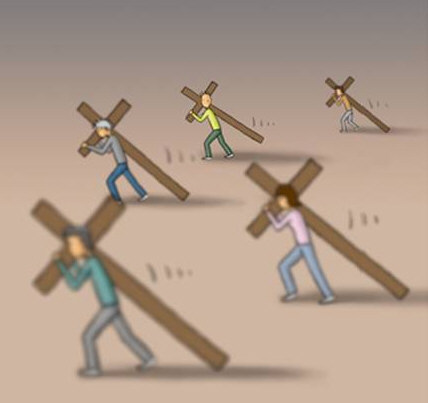Matthew 16:21-28, Contemporary English Version
 From then on, Jesus began telling his disciples what would happen to him. He said, “I must go to Jerusalem. There the nation’s leaders, the chief priests, and the teachers of the Law of Moses will make me suffer terribly. I will be killed, but three days later I will rise to life.”
From then on, Jesus began telling his disciples what would happen to him. He said, “I must go to Jerusalem. There the nation’s leaders, the chief priests, and the teachers of the Law of Moses will make me suffer terribly. I will be killed, but three days later I will rise to life.”Peter took Jesus aside and told him to stop talking like that. He said, “God would never let this happen to you, Lord!”
Jesus turned to Peter and said, “Satan, get away from me! You’re in my way because you think like everyone else and not like God.”
Then Jesus said to his disciples:
If any of you want to be my followers, you must forget about yourself. You must take up your cross and follow me. If you want to save your life, you will destroy it. But if you give up your life for me, you will find it. What will you gain, if you own the whole world but destroy yourself? What would you give to get back your soul?
The Son of Man will soon come in the glory of his Father and with his angels to reward all people for what they have done. I promise you that some of those standing here will not die before they see the Son of Man coming with his kingdom.
We’re Number Two
Now I’ve got to admit, I’m a little bummed today. You see, typically, on this particular Sunday morning I expect to be fat and sassy. As a matter of fact, from every pore in my body, I should literally be oozing college football. Every year, I look forward to this last weekend in August, because it represents the dawning of about four months of fatness and sassiness. I guess you could say that, right along with my wife, my daughter and oysters, I love college football.
 Of course, as it is with almost everything else, this year is different. And even though I recognize that the NFL will be kicking off in a couple of weeks, I really prefer the college game, outside of the ridiculous way they handle overtime, but I digress. I love college football. But you know, it’s not just the game. It’s the whole environment. Now understand, when I lived in Indianapolis, I had Colt season tickets and so I enjoy what you could call the professional ambiance. But let’s get real, there’s nothing like college football. Good night nurse, the enthusiasm is off the charts. And with all those students crammed into a stadium, man, you might see or hear almost anything, with the exception of this. You’re not going to hear anyone chant, “We’re Number Two.” I can guarantee, those words you’ll never hear, because nobody in those stands wants to admit verbally that their team is anything other than number one. As they say, in football winning isn’t everything. It’s the only thing.
Of course, as it is with almost everything else, this year is different. And even though I recognize that the NFL will be kicking off in a couple of weeks, I really prefer the college game, outside of the ridiculous way they handle overtime, but I digress. I love college football. But you know, it’s not just the game. It’s the whole environment. Now understand, when I lived in Indianapolis, I had Colt season tickets and so I enjoy what you could call the professional ambiance. But let’s get real, there’s nothing like college football. Good night nurse, the enthusiasm is off the charts. And with all those students crammed into a stadium, man, you might see or hear almost anything, with the exception of this. You’re not going to hear anyone chant, “We’re Number Two.” I can guarantee, those words you’ll never hear, because nobody in those stands wants to admit verbally that their team is anything other than number one. As they say, in football winning isn’t everything. It’s the only thing.But you know, although no real fan wants to accept second place, I think that’s exactly what Jesus is telling us to do in the passage I just read. In other words, in this little story, I believe Jesus told this disciples then and tells his disciples right now that we should probably be offering a chant we’ll never hear at a Mountaineer or Buckeye game, “We’re number two.” And I’ll tell you, that’s going to be our focus this morning. And as we consider what he was saying to them and is saying to us, we’re going to answer three questions: first, with respect to Jesus, exactly where are we suppose to be; second, how do we get there; and third, why is that important for us to do. Now, that’s our game plan this morning.
Of course, the first question, well, I’ve pretty much answered it, haven’t I? With respect to Jesus, exactly where are we suppose to be? We’re suppose to be somewhere behind him, right? I mean, dah. But it’s not just me saying it, just remember what Matthew wrote: “From then on, Jesus began telling his disciples what would happen to him. He said, ‘I must go to Jerusalem. There the nation’s leaders, the chief priests, and the teachers of the Law of Moses will make me suffer terribly. I will be killed, but three days later I will rise to life.’ Peter took Jesus aside and told him to stop talking like that. He said, ‘God would never let this happen to you, Lord!’ Jesus turned to Peter and said, ‘Satan, get away from me! You’re in my way because you think like everyone else and not like God.’” [Matthew 16:21-23, CEV] Now that’s what happened.
 And I’ve got to tell you, I don’t think it takes a rocket scientist to figure out why Peter did what he did and Jesus said what he said. I mean, to this point in the Gospel, it’s been pretty much peaches and cream, right? Jesus has been performing miracles and he’s been healing the sick and he’s been casting out demons right and left. His lessons have authority and his parables were engaging and his one sermon, you know, the one on the mount, wasn’t even boring. Jesus was a star. And Peter was certainly his right hand man. Good night, this had just happened: “Then Jesus asked them, ‘But who do you say I am?’ Simon Peter spoke up, ‘You are the Messiah, the Son of the living God.’ Jesus told him: Simon, son of Jonah, you are blessed! You didn’t discover this on your own. It was shown to you by my Father in heaven. So I will call you Peter, which means “a rock.” On this rock I will build my church, and death itself will not have any power over it. I will give you the keys to the kingdom of heaven, and God in heaven will allow whatever you allow on earth. But he will not allow anything that you don’t allow.” [Matthew 16:15-19, CEV] I’m telling you, both Jesus and Peter were riding high; therefore, it’s really not surprising that, when Peter heard Jesus shift from talking about how great the Kingdom of Heaven was going to be to how he was going to suffer and die, naturally he felt the need to offer some good PR advice, and that’s exactly what he did. Of course, in doing that, he was not only tempting Jesus to veer from his purpose, Peter was also forgetting his place as a disciple. You see, disciples of Jesus Christ, the Son of the living God, man, they don’t lead. And they don’t advise. And they don’t suggest. They simply follow, something that Peter had forgotten.
And I’ve got to tell you, I don’t think it takes a rocket scientist to figure out why Peter did what he did and Jesus said what he said. I mean, to this point in the Gospel, it’s been pretty much peaches and cream, right? Jesus has been performing miracles and he’s been healing the sick and he’s been casting out demons right and left. His lessons have authority and his parables were engaging and his one sermon, you know, the one on the mount, wasn’t even boring. Jesus was a star. And Peter was certainly his right hand man. Good night, this had just happened: “Then Jesus asked them, ‘But who do you say I am?’ Simon Peter spoke up, ‘You are the Messiah, the Son of the living God.’ Jesus told him: Simon, son of Jonah, you are blessed! You didn’t discover this on your own. It was shown to you by my Father in heaven. So I will call you Peter, which means “a rock.” On this rock I will build my church, and death itself will not have any power over it. I will give you the keys to the kingdom of heaven, and God in heaven will allow whatever you allow on earth. But he will not allow anything that you don’t allow.” [Matthew 16:15-19, CEV] I’m telling you, both Jesus and Peter were riding high; therefore, it’s really not surprising that, when Peter heard Jesus shift from talking about how great the Kingdom of Heaven was going to be to how he was going to suffer and die, naturally he felt the need to offer some good PR advice, and that’s exactly what he did. Of course, in doing that, he was not only tempting Jesus to veer from his purpose, Peter was also forgetting his place as a disciple. You see, disciples of Jesus Christ, the Son of the living God, man, they don’t lead. And they don’t advise. And they don’t suggest. They simply follow, something that Peter had forgotten.And you know, I think that’s something we forget ourselves from time to time. You see, sometimes I believe we think can take the Good News and make it better. I mean, what Jesus taught may be all well and good back in the day, but does that mean it can’t be improved? You see, we can make it more popular right now, by really hammering some commandments, while letting some others sort of slide. Just doing that will make it easier for folks to accept. And let’s get real, we all know that sacrifice doesn’t sell. For example, even though we’re running record deficits and the national debt is going up faster than any time in our history, who’s going to vote for a candidate who promises to raise our taxes and cut our services? I mean, dah. Now maybe raising and cutting them and you know who “they” are, now, that may be fine; but not us. You see, we like to be number one. But as it comes to Jesus, maybe we should be spending more time reading and praying and following than in making suggestions and offering advice and trying to lead. And so there you have it, question number one: with respect to Jesus, exactly where are we suppose to be? The answer: we’re number two, following him.
And you know, if that was the only question Jesus answered, I’m telling you, that would be nice to know information. But that’s not all he said. I mean, right after this little kerfuffle with Peter, this was what happened: “Then Jesus said to his disciples: If any of you want to be my followers, you must forget about yourself. You must take up your cross and follow me.” [Matthew 16:24, CEV] Now that’s what he said, and I think that answers our second question: how do we get there? How do we get behind and start following Jesus? In other words, how can we put ourselves as number two.
 And you know, if the stuff about how Jesus was going to suffer was bad, this business about how disciples are suppose to sacrifice, man, that’s even worse. In fact, for Jesus it all came down to three steps. One, it involves forgetting about ourselves: forgetting about what we want, what we have, what we think, and what we believe we deserve. It’s about putting all that “me,” “my” and “mine” stuff on the back burner. That’s one. And then, two, it means taking up our cross. And let me be clear about this cross business; in the first century, crosses represented a whole lot more than sassy kids, patterned baldness or having to wear a mask during a pandemic. For those disciples, a cross was the ultimate symbol of sacrifice, and I’m talking about life and death. And that’s exactly what we’re called to carry. And that leads to step number three, the following part, in other words, doing what Jesus did and being guided by what he taught. That’s how we get behind him.
And you know, if the stuff about how Jesus was going to suffer was bad, this business about how disciples are suppose to sacrifice, man, that’s even worse. In fact, for Jesus it all came down to three steps. One, it involves forgetting about ourselves: forgetting about what we want, what we have, what we think, and what we believe we deserve. It’s about putting all that “me,” “my” and “mine” stuff on the back burner. That’s one. And then, two, it means taking up our cross. And let me be clear about this cross business; in the first century, crosses represented a whole lot more than sassy kids, patterned baldness or having to wear a mask during a pandemic. For those disciples, a cross was the ultimate symbol of sacrifice, and I’m talking about life and death. And that’s exactly what we’re called to carry. And that leads to step number three, the following part, in other words, doing what Jesus did and being guided by what he taught. That’s how we get behind him.And I’m going to be straight with you, doing that isn’t easy, but then why should it be. Remember, a little later in the story, when a guy asked how he might have eternal life and after he said he’d done everything the Law required, “Jesus replied, ‘If you want to be perfect, go sell everything you own! Give the money to the poor, and you will have riches in heaven. Then come and be my follower.’ When the young man heard this, he was sad, because he was very rich.” [Matthew 19:21-22, CEV] Now that’s what I call turning from self. But of course, he wouldn’t say that to us, right? And as to following, what about this prophecy Jesus offered explaining how the Son of Man was going to judge the nations: “Then the king will say to those on his right, ‘My father has blessed you! Come and receive the kingdom that was prepared for you before the world was created. When I was hungry, you gave me something to eat, and when I was thirsty, you gave me something to drink. When I was a stranger, you welcomed me, and when I was naked, you gave me clothes to wear. When I was sick, you took care of me, and when I was in jail, you visited me.’” [Matthew 25:34-36, CEV] Now that’s some heavy lifting and following, right? But of course, he wouldn’t hold the United States to those standards, right? You see, in what he says to those disciples, I think he answers question number two: how do we get there? And I’m talking about how do we put ourselves behind Jesus?
And so with one and two answered, all we have left is question number three: Why is it important for us? Just listen to what Jesus said. “If you want to save your life, you will destroy it. But if you give up your life for me, you will find it. What will you gain, if you own the whole world but destroy yourself? What would you give to get back your soul? The Son of Man will soon come in the glory of his Father and with his angels to reward all people for what they have done.” [Matthew 16:25-27, CEV] Now that what he said.
 And for those who heard him and those who still listen, well, I think there were two excellent reasons for following. I mean, on one hand, it determines what we do in the here and now. You see, if we’ve decided to do whatever it takes to save ourselves and the heck to everybody, man, we just may lose what’s most important. Of course, we may get a lot of stuff, you know, that kind of stuff that rust will eventually destroy and thieves break in and steal. In fact, we may get so much stuff we end up laying awake at night thinking about the bigger barns we’ll need to build in the future. Oh sure, stuff we’ll have. But understand the cost is high. I mean, to get all that stuff we may have to sacrifice a lot of our integrity and self-respect and self-esteem and frankly, some of our basic goodness and faith. But we’ll have plenty of stuff. You see, on one hand, the price may be pretty high in the short term.
And for those who heard him and those who still listen, well, I think there were two excellent reasons for following. I mean, on one hand, it determines what we do in the here and now. You see, if we’ve decided to do whatever it takes to save ourselves and the heck to everybody, man, we just may lose what’s most important. Of course, we may get a lot of stuff, you know, that kind of stuff that rust will eventually destroy and thieves break in and steal. In fact, we may get so much stuff we end up laying awake at night thinking about the bigger barns we’ll need to build in the future. Oh sure, stuff we’ll have. But understand the cost is high. I mean, to get all that stuff we may have to sacrifice a lot of our integrity and self-respect and self-esteem and frankly, some of our basic goodness and faith. But we’ll have plenty of stuff. You see, on one hand, the price may be pretty high in the short term.On the other hand, though, it’s nothing like the price we may be paying in the future. I mean, remember that passage I just read about how Jesus praised those nations that fed the hungry and welcomed the strangers and cared for the sick. Well, he was just as harsh on those nations that didn’t. In fact, this was how the prophecy ended: “Then Jesus said, “Those people will be punished forever. But the ones who pleased God will have eternal life.” [Matthew 25:46, CEV] Now that’s what Jesus said. Of course, we also want to remember that, when talking about the rich young man I mentioned a little while ago, this was what happened: Jesus said to his disciples, “It’s terribly hard for rich people to get into the kingdom of heaven! In fact, it’s easier for a camel to go through the eye of a needle than for a rich person to get into God’s kingdom.” When the disciples heard this, they were greatly surprised and asked, “How can anyone ever be saved?” Jesus looked straight at them and said, “There are some things that people cannot do, but God can do anything.” [Matthew 19:23-26, CEV] You see, salvation is a gift, not a wage. Still, for my own peace of mind, I’d much rather be with the ones who can look at their lives and be confident of having eternal life than those whom Jesus said will be punished forever. And that’s really the answer to question number three, why is following Jesus important for us?
Now remember how I said that I was bummed this morning. Well, bummed isn’t as bad as crushed. You see, at 9:00 last evening, on ESPN, I watched Austin Peay play Central Arkansas in the Cramton Bowl. What do they say; any port in a storm? I think I’m still a little damp, but I did get my college football fix. And even though I can’t prove it, I seriously doubt that any of those 2,000 Governor or the Bear fans were chanting, “We’re number two,” even after Austin Peay scored on their play or Central Arkansas pulled it out at the end. Real fans just don’t do that. And yet that’s probably what we should be saying when we leave here this morning. You see, when you get right down to it, with respect to Jesus Christ, that’s exactly where we should be. And we can get there by shifting our focus from self to God and others. And we should probably do it because it’s going to make a difference in what we do right now and how we end up viewing our future. And now this we know. But we can save the chanting until we get home.


















